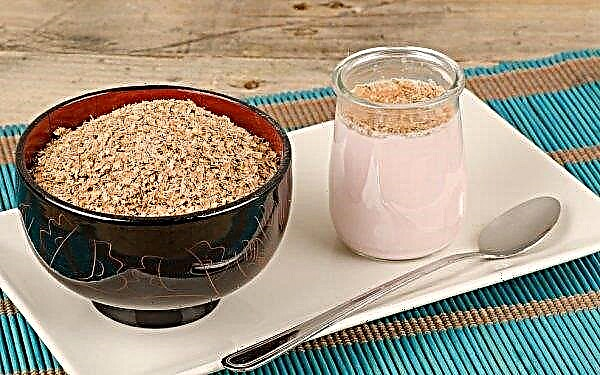With a disease such as hemorrhoids, you must follow a special diet to carefully monitor the regularity of the stool. One of the products that positively affect the quality of digestion and the general state of health in such a disease is carrots. If you want to get rid of unpleasant symptoms, you should learn more about the benefits and harms of the root crop, as well as the rules for its use in hemorrhoids.
Chemical composition and calorie content
The nutritional value of carrots per 100 g:
- calorie content - 35 kcal;
- proteins - 1.3 g;
- fats - 0.1 g;
- carbohydrates - 6.9 g;
- dietary fiber - 2.4 g;
- organic acids - 0.3 g;
- water - 88 g;
- ash - 1 g.

Vitamin and mineral composition of the product:
| Vitamins: | Macronutrients: | Trace elements: |
|
|
|
Did you know? Wild carrots initially had a purple color, less often there were specimens of a white and yellow shade. Orange varieties were bred by the Dutch only in the XVII century.
Useful composition of carrots
- The positive effect of carrots on the body is due to its rich vitamin and mineral composition:
- B vitamins (beta-carotene, thiamine, riboflavin, choline, pantothenic acid, pyridoxine, folates, biotin) are the main building blocks of the cells of the human body, and also take part in the production of enzymes - they help improve the working capacity of the nervous system, accelerate tissue regeneration at the cellular level, increase elasticity of the skin;
- vitamin C participates in the formation of cells of the immune system, which contributes to an increase in the body's overall resistance to negative environmental factors;
- vitamin e (alpha-tocopherol) - slows down the aging and death of cells, helps strengthen the walls of the capillaries, participates in the process of blood enrichment with oxygen and the regulation of the endocrine system;
- phylloquinone (Vitamin K) - participates in the process of regulating blood coagulation; without it, the human body could not cope with the healing of even a small scratch, in addition, it helps the absorption of calcium, improves the functioning of the kidneys, liver, and gall bladder;
- niacin (PP) - accelerates metabolism, promotes tissue enrichment with oxygen, participates in oxidative reactions;
- minerals (micro and macro elements) are vital components for the human body, playing an important role in the structure of skeleton tissues, the regulation of acid-base metabolism, the creation of a certain amount of hydrogen ions in cells, tissues, as well as intercellular and interstitial fluids, which ensures their normal the state and full course of metabolic processes;
- alimentary fiber help to improve the digestion process, facilitate the bowel movement.

Can I eat carrots for hemorrhoids
First of all, with hemorrhoids, it is necessary to choose a diet that will help normalize digestion, improve bowel movements and prevent constipation. Carrots in this diet are an indispensable product. It can and should be consumed at least once a day.
Did you know? In the XVII century. in England, fashion was considered the decoration of carrot tops.
What in the composition can adversely affect health
For all the benefits of the vegetable in question, one should not lose sight of the fact that some of the components that make up its composition can harm the body. These include carotenoids - dyes that cause the bright orange color of carrots. If the recommended daily dose (375 g for an adult) is exceeded, yellowing of the skin may be observed.. A large amount of beta-carotene is poorly absorbed by the liver. As a result, hemoglobin does not decompose completely, and its residues accumulate in the subcutaneous adipose tissue.

Features of use
With hemorrhoids, carrots can be eaten fresh and processed. The main thing is to observe daily dosages and consider contraindications. In addition to oral administration, compresses and enemas are made on the basis of root juice.
Fresh
Throughout the day, fresh, you can consume 375 g of carrots as a light snack between the main meals. This amount is best divided into several parts. Before consumption, rub on a fine grater.
Important! Carrots contain a fairly large amount of dietary fiber, which is digested for a long time, so you should not eat it at night. Otherwise, abdominal pain or bloating may occur.
You need to organize meals of such a plan in courses - 2 weeks to eat carrots daily, then a break for 10-20 days. For six months, you can conduct up to 6 such courses.

Boiled
In the processed form, the daily norm of root crop consumption can be increased to 500 g. The product that has undergone heat treatment can be introduced into the diet as a side dish or vegetable low-calorie salads. Eating it is acceptable daily without interruption.
Carrot juice
Root juice is used for:
- ingestion - up to 800 ml per day 20 minutes before meals;
- compresses - make a swab from gauze, moisten in juice and apply to a sore spot for 20 minutes (it is better to carry out the procedure before bedtime);
- microclyster - the concentrate is diluted with warm water 1: 1 and using a small pear is poured into the anus (to be manipulated 2-3 hours before bedtime).

Carrot tops
Useful properties are possessed not only by root crops, but also by tops. It is used to prepare a decoction (for 1 liter of boiling water 1 tsp. Foliage). Drinking take 1-2 hours before bedtime, 200 ml once a day for a month. You can also use a decoction for compresses or microclysters.
Important! Before starting treatment, consult your doctor who will help you choose the optimal diet based on your physiological characteristics.
When is carrot contraindicated?
- Contraindications to the use of root crops and their tops is:
- gastric and duodenal ulcer;
- problems in the liver and pancreas;
- gastritis, accompanied by increased acidity;
- enterocolitis;
- any gastrointestinal diseases in the acute phase;
- dysbiosis;
- pregnancy (allowable rate of not more than 100 g per day).

Carrots are a source of valuable vitamins and minerals necessary to maintain the health of the body. It is actively used in the treatment of a disease such as hemorrhoids, in order to improve digestive functions and metabolic processes.












